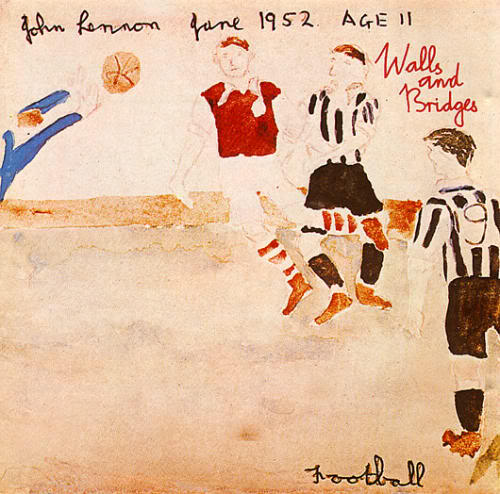
Walls and Bridges (1974)

1. Going Down on Love
2. Whatever Gets You Thru the Night
3. Old Dirt Road
4. What You Got
5. Bless You
6. Scared
7. No. 9 Dream
8. Surprise, Surprise (Sweet Bird of Paradox)
9. Steel and Glass
10.Beef Jerky
11.Nobody Loves You (When You're Down and Out)
12.Ya Ya
By 1974, John Lennon was adrift—physically separated from Yoko Ono, emotionally scattered, and professionally uncertain. The press dubbed it his “lost weekend,” a misnomer for what was, in truth, an 18-month period of heavy drinking, public embarrassments, and creative reorientation. Walls and Bridges, recorded during this time, is the odd product of emotional chaos rendered as musical coherence. It is neither Lennon’s most iconic nor his most critically revered album, but it may be his most listenable.
Of all Lennon’s solo records, Walls and Bridges is perhaps the easiest to enjoy. It doesn’t demand introspection like Plastic Ono Band, nor does it reach for cultural significance like Imagine. Instead, it settles into something far rarer for Lennon: a well-crafted pop record with enough stylistic range to keep things interesting and enough restraint to keep things together.
The standout hit, Whatever Gets You Thru the Night, is famously buoyed by Elton John, both musically and mythologically. Their wager over the song’s commercial potential—Lennon didn’t believe it would be a hit—culminated in his final concert appearance alongside Elton at Madison Square Garden. That it reached No. 1 isn’t altogether surprising. It’s catchy, funky, and completely of its moment. Lennon sounds more playful than profound, and that’s precisely its appeal. Then there’s #9 Dream, an ethereal ballad that feels like a return to the surreal soundscapes of Strawberry Fields Forever and I Am the Walrus. It is lush, hypnotic, and gorgeously constructed—less a narrative than a mood, and one of Lennon’s finest post-Beatles moments. Dreamy, yes, but with a clarity of vision that marks it apart.
The album as a whole benefits from a high level of craftsmanship. The production is slick—perhaps too slick for some tastes—but the polish works in its favor. Songs like Bless You and Old Dirt Road might veer toward lounge territory, but they’re immaculately written and performed with a sincerity that undercuts any accusations of artifice. Even the brass-laden Surprise, Surprise (Sweet Bird of Paradox) and the biting Steel and Glass manage to blend gloss with grit. The latter, in particular, is often seen as a pointed jab at Allen Klein, Lennon’s former manager, though it’s sonically compelling enough to transcend the personal.
Scared offers a glimpse of vulnerability—Lennon’s voice strained and exposed—though the howling werewolf intro threatens to undercut the track’s emotional weight. It’s a rare moment where Lennon’s penchant for quirk detracts from rather than enhances the music. And then there’s Beef Jerky, a brief, instrumental oddity that feels like a less inspired cousin of Harrison’s Savoy Truffle.It’s disposable, but short.
The primary critique often leveled at Walls and Bridges is its inconsistency—stylistically diverse to the point of fragmentation. But one might argue that this eclecticism reflects the moment from which it came. Lennon was between anchors, personally and musically, and the album’s tonal shifts mirror that instability. What’s impressive is how cohesive it still sounds, despite the variety.
It may not be Lennon’s best album—but Plastic Ono Band casts a long shadow over everything. What Walls and Bridges achieves is subtler: it reminds us that Lennon, for all his contradictions and cultural weight, could still write good songs, arrange them well, and perform them with conviction. For all its imperfections, it’s a deeply satisfying listen.
Sometimes, coherence is overrated.
Go back to the main page
Go To Next Review